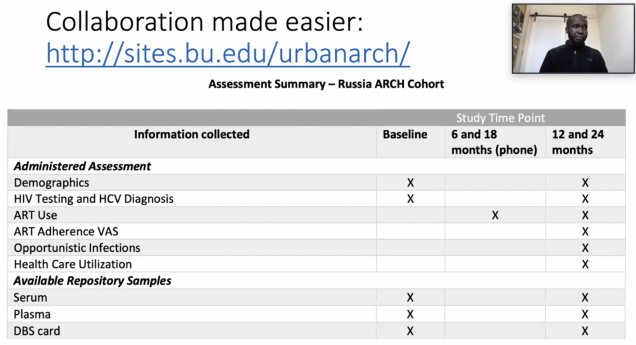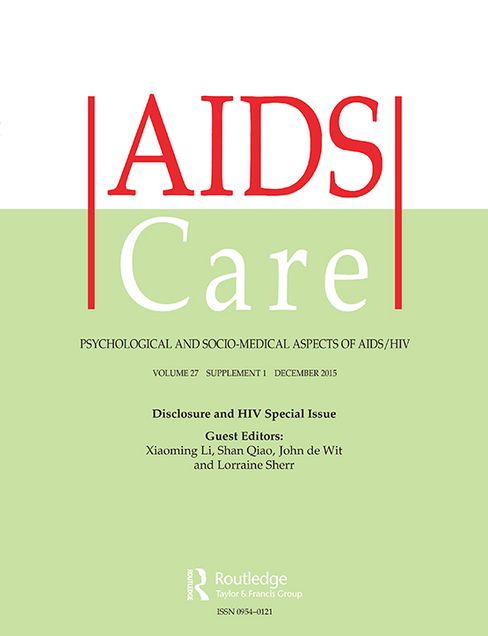Core and Cohort Updates
Admin Core Update:
Over the past three months, the Admin Core team has been busy preparing for the upcoming Data Safety Monitoring Board (DSMB) meeting on March 16, 2021 and the URBAN ARCH Training and Mentoring Event on March 17, 2021. The URBAN ARCH Admin Core looks forward to receiving valuable feedback from DSMB members, and the opportunity to establish valuable trainee-mentor connections and galvanize future research opportunities at the Training and Mentoring Event!
There are multiple repository requests in the queue for this next quarter. Plasma and serum samples will be pulled and sent to the University of Vermont, the Miriam Hospital in Providence, the Cleveland Heart Lab, and the University of Toronto. The URBAN ARCH Sample Repository is also preparing for a large shipment from St. Petersburg, Russia, and multiple shipments containing samples from Uganda. For more information on the URBAN ARCH sample repository, please visit our webpage. If you have questions regarding the URBAN ARCH repository, please contact Natalia Gnatienko.
March 16 marks one year since our Admin Core team began working remotely. Although this past year has been difficult for all of us, we are thankful to work with such an incredible team. We hope to be together again at this time next year!
BDM Core Update:
The BDM Core has been working to prepare reports for the spring Data Safety Monitoring Board meeting. In addition, Core members have been actively involved in numerous analyses across the Consortium including the main St PETER RCT analyses, the main analyses for the Boston 4F study, as well as 2 cross cohort analyses. BDM member Leah Forman is also leading a study comparing measures of adherence to Isoniazid preventive therapy in the ADEPTT Study.
Uganda Cohort Update:
ADEPTT
The ADEPTT study concluded enrollment in January of 2020 with 302 participants, including 155 females and 147 males. Of these, 200 are current alcohol drinkers and 102 are alcohol abstainers.
As of March 1, 2021, we completed baseline procedures for all 302 participants enrolled, 295 month-3 visits, 292 month-6 visits, 289 month-12 visits, 265 month-18 visits, 164 month-24 visits, 126 month-30 visits, 72 month-36 visits, and 33 month-42 visits. Twenty-six participants discontinued TB preventive therapy (INH) due to grade 3/4 level toxicities and three women discontinued INH due to being pregnant. Two hundred and fifty-six participants have completed all study activities and have graduated from the study. We have completed PEth testing on 950 dried blood spot (DBS) samples shipped from Uganda to United States Drug Testing Laboratory (USDTL) in Illinois, USA. We are in the process of completing analyses and the manuscript for the ADEPTT main aims.
Our COVID-19 related administrative supplement was funded in late September, 2020. With this funding, we will look at changes in alcohol use, ART levels, and viral suppression before, during, and after stay-home restrictions in PLWH in Uganda and Boston and the association of alcohol use and changes in alcohol use with these outcomes in the same cohorts. We anticipate that enrollment in both the Boston and Uganda cohorts will commence within this month.
DIPT
The main aims of this randomized controlled trial (the DIPT study) are to examine whether economic incentives provided to HIV/TB co-infected heavy drinkers can reduce alcohol use and increase adherence to isoniazid preventive therapy (IPT). The DIPT study is progressing well. As of March 1, 2021, we have enrolled 598 participants who are point-of-care ethyl glucuronide (EtG) test-confirmed heavy drinkers with latent TB (out of our target enrollment of 680). Retention has been excellent. Data analyses are on-going as well as manuscript writing.
EXTEND
The main aims of the EXTEND RCT are to estimate the uptake and acceptability, preliminary efficacy, and cost of methods of delivery of an intervention to reduce unhealthy drinking and HIV viral failure among persons in HIV care in rural Uganda (n=270). We concluded enrollment in this study at the end of December, 2020 with 273 participants, (270 participants plus 3 pilot participants). To enroll 270, we screened a total of 976 patients at the Mbarara ISS Clinic, including 654 males and 322 females. Of the 273 participants enrolled in the RCT, 181 were male and 92 were female, 91 were randomized to arm 1 (in-persons counseling plus live call boosters); 91 were randomized to arm 2 (in-person counseling plus automated boosters); and 91 were randomized to arm 3 (standard of care, wait-list control). Participants in arm 2 (automated boosters) are given a choice between Interactive Voice Response (IVR) or Short Message service (SMS) messages for their booster sessions and approximately two thirds (65) of them chose IVR while about one third (29) of them chose SMS as their preferred automated booster message delivery option.
We published our first paper led by Anna Leddy (Judy Hahn’s mentee at UCSF) describing our adaptation of the counseling intervention originally implemented in Baltimore, USA, for our study setting in Uganda. We are coding qualitative data from post-intervention interviews and completing analyses and manuscript writing for the costing data, and lessons learned with the study implementation. The first set of DBS samples (n= 450) shipped from Uganda to USA, and are being tested for PEth at USDTL, Illinois.
Leddy AM, Hahn JA, Getahun M, Emenyonu NI, Woolf-King SE, Sanyu N, Katusiime A, Fatch R, Chander G, Hutton HE, Muyindike WR, Camlin CS. Cultural Adaptation of an intervention to reduce hazardous alcohol use among people living with HIV in southwestern Uganda. AIDS Behav. Feb 2021.
Russia Cohort Update:
The Russia team completed follow-up for all St PETER study visits on December 15, 2020 with a 12-month visit completion rate of 81.5%. The team held a data review meeting on February 26 to discuss future analyses. If you were unable to attend the meeting, but are interested in leading a future analysis, please contact Sally Bendiks (sally.bendiks@bmc.org).
The St PETER COVID Study began recruitment on January 19, 2021. As of March 1, 2021, 44 participants have completed the study assessment. This phone interview aims to evaluate the effects of the pandemic on tobacco and alcohol use; self-reported infection with COVID-19; past 30-day use of alcohol, cigarette, and other tobacco via TLFB; e-cigarette use; lifetime alcohol use; and COVID-19 vaccination uptake.
PETER PAIN UH3 began recruitment on January 26, 2021. As of March 1, 2021, 4 participants have been randomized. This study will randomize 45 participants into three arms: gabapentin, low-dose naltrexone, and placebo to test the effectiveness of gabapentin and low-dose naltrexone in decreasing pain among people living with HIV who drink heavy amounts of alcohol.
On February 11, 2021, Kaku So-Armah, PhD gave a virtual oral presentation titled “Alcohol and immune function among people with HIV” at the Boston Medical Center Infectious Disease Grand Rounds. During his talk, Dr. So-Armah presented data from the Russia ARCH cohort and invited potential collaborators to reach out if interested in utilizing URBAN ARCH data.

The team is now actively pursuing data analyses, abstract submissions, and manuscript preparation.
Published Manuscripts:
Bendiks S, Cheng DM, Blokhina E, Vetrova M, Verbitskaya E, Gnatienko N, Bryant K, Krupitsky E, Samet J, Tsui J. Pilot study of tolerability and safety of opioid receptor antagonists as novel therapies for chronic pain among persons living with HIV with past year heavy drinking: a randomized controlled trial. AIDS Care. 2021;1-10.
Vetrova M, Cheng DM, Bendiks S, Gnatienko S, Lloyd-Travaglini C, Jiang W, Luoma J, Blokhina E, Krupitsky E, Lioznov D, Ekstrand M, Raj A, Samet JH, Lunze K. HIV and substance use stigma, intersectional stigma and healthcare among HIV-positive PWID in Russia. AIDS Behav. Jan 2021.
Boston Cohort Update:
The Boston ARCH: 4F Cohort, a study whose main aim is to assess the association between alcohol consumption and falls, fractures, frailty, and physical function (4F) among people with HIV infection and substance use disorder, began recruitment in January 2018.
In February 2021, the Boston ARCH: 4F Cohort concluded study recruitment, with a final cohort of 251 participants (176 participants from the original Boston ARCH Bone Cohort and 75 participants new to the cohort). Follow-up assessment, which began in June 2018, is ongoing. As of March 1, 2021, 233 6-month follow-up phone interviews, 205 12-month annual follow-up visits, 158 18-month interim follow-up phone interviews, 101 24-month annual follow-up visits, 48 30-month follow-up phone interviews, and 3 36-month annual follow-up visits have been completed.
Following the conclusion of the collection and analysis of qualitative data used to inform the development of a falls prevention intervention tailored for people with HIV, alcohol use, and at risk of falls, we developed a protocol for a pilot feasibility study of the intervention. We are in the process of finalizing and submitting the study protocol for review and approval by the Boston University Medical Campus Institutional Review Board (IRB). The study aims to enroll 40 participants who will be randomized to either the intervention group (receiving the fall prevention intervention) or a control group. After the study protocol is IRB-approved, participant recruitment and enrollment will begin.
Additionally, in September 2020 we were awarded COVID-19 administrative supplemental funding from NIAAA to expand the scope of our existing Boston ARCH: 4F Cohort study to assess the impact of the COVID-19 pandemic and the effects of physical (social) distancing and other mitigation strategies on substance use (heavy alcohol use and/or other drug use including nonmedical prescription medication use) and HIV medication adherence among people living with HIV. In January 2021, the study team began administering the supplemental COVID-19 specific assessments to Boston ARCH: 4F Cohort participants, which will occur at two time points (6 months apart).

